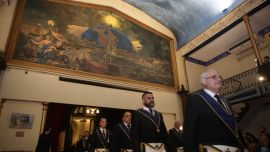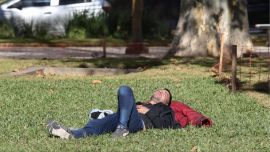Andrew Graham-Yooll was 75 when he died early this month (and almost exactly halfway through to 76). A person’s age at demise is a number invariably forming part of obituary routine but rarely important. And yet I would see it as absolutely essential to understanding Andrew. Both his parents died before they were 60 (a fact he mentioned not infrequently) and he spent most of his life convinced that he would never see his 60th birthday until he actually did in the first days of 2004 – a conviction only enhanced by his first massive heart attack (in 1996, if I remember correctly), typically suffered while lugging enormous suitcases of books through the airport. In his own eyes he thus enjoyed over two decades of borrowed time since that heart attack – a loan he repaid with interest.
The late Buenos Aires Herald housed many more good journalists than could be reasonably expected in my time there (1983-2017) but only two stand out in my memory as truly great: Robert Cox and Andrew Graham-Yooll. And both of them do so for reasons of formal achievement and sheer dint of personal journalistic talent alike. Even the best of the others, while often continuing their careers abroad and sometimes very successfully, never reached a top institutional role in the international press world. Bob Cox, however, became president of the Inter-American Press Association (IAPA) while Andrew was the editor of Index on Censorship, the guardian of press freedom worldwide, for five years.
But such institutional eminence is always less important than the quality of their journalistic work. Here this obituary is not about Robert Cox (mercifully still very much with us and heading for 86 at the end of this year) but about Andrew.
Most journalists in pre-Internet days began their careers on the beat, digging up the basic news before graduating to an office where they could look at the big picture. Andrew was the other way round. Entering the Herald at the age of 22 in 1966, he rapidly created the ‘Politics & Labour’ Sunday column (which I found to be an ideal forum for armchair analysis in the last 14 years of the 20th century, as did James Neilson in the decade before me). But while continuing at the column until forced into exile in 1976, he became increasingly less interested in drawing conclusions from news events than in exploring their root causes – especially when the dramatic spiral into violence began as from 1970. And this meant going to the sources – even when those sources were the Montonero guerrillas, dangerous criminals by almost any standard. Later he was to be a key witness in the kidnapping of the Born brothers – for Andrew journalism was not the echo chamber of likeminded talking heads, which it is for so many of us.
Strictly speaking, Andrew never played a leading role in the exposure of military dictatorship disappearances which was to make Cox’s Herald so internationally famous for the simple reason that he left too soon – those Montonero contacts got him into too much trouble. Then came his English exile (1976-1994), about which I often ribbed him as lasting 18 years, exactly like General Juan Domingo Perón (1955- 1973), a comparison he never seemed to enjoy.
In 1994 he became the first and only person to be simultaneously Herald editor-in-chief and CEO, a dual role he held for four years. For most of us the newspaper died in 2016 as a daily and as a weekly in 2017, but for Andrew it perished in late 2007 when the newspaper ownership was sucked into the Kirchnerite media machine and he took a slightly early retirement. Some of us (like this scribe) stayed on, in the hope that turning the newspaper into a Vichy France might be a lesser evil to direct occupation, but for Andrew, journalistic independence was an absolute and there could be no compromise.
Both the quantity and quality of his work were awesome. Countless thousands of newspaper articles and columns while publishing over 30 books. And the quality? One immensely erudite, Cambridge-educated cinematic and cultural critic we had, Julian Cooper (who died at the turn of the century), liked to compare Andrew to Graham Greene – “Doesn’t know how to write but has something to say.” As a product of Julian’s university myself, I’m inclined to share Julian’s verdict but only where his newspaper work was concerned – his columns were often rambling yet always had something to say. But if journalism is often described as “literature in a hurry,” his books were solid gold as mines of information. The Forgotten Colony will always remain unsurpassed as a chronicle of the Anglo-Argentine community but one personal favourite of mine is Small Wars You May Have Missed about South American conflicts of long ago, which the historical profession has generally bypassed.
But all work and no play makes Jack a dull boy – and Andrew too. Just as prominent in my memories of him are the diplomatic receptions and other social events we shared. Andrew understood receptions quite literally as opportunities to receive as abundantly as possible, an approach in which I have always been one of his keenest disciples. I might be mistaken here but I just do not remember him slackening his pace at all in his last years. Yet nobody should run away with the idea that Andrew was a hard drinker. Although of Scottish origin, I cannot remember him touching a Scotch – it was always Argentine red wine which flowed through his veins.
I do not know how gently he went into that good night but rest in peace is almost the last thing I would want to say about Andrew. His 75 years seem too short for everything he had still to give, and in light of constantly increasing life expectancy, but the latter should also be measured against personal expectations and I cannot feel angry or bitter about his passing, only deeply saddened.
Life gave him a bonus and he gave life a bonus.























Comments